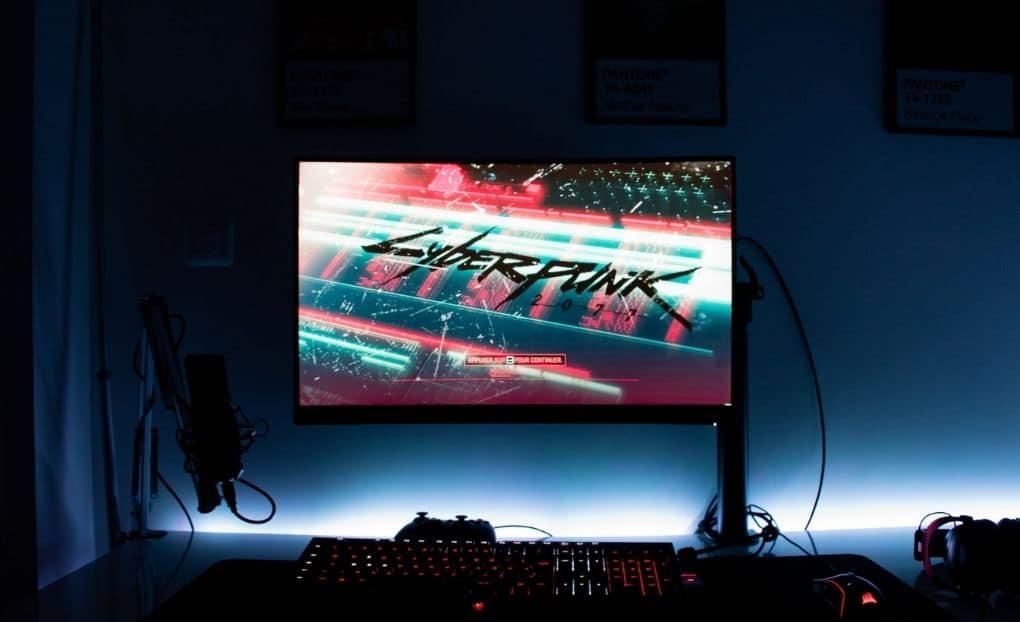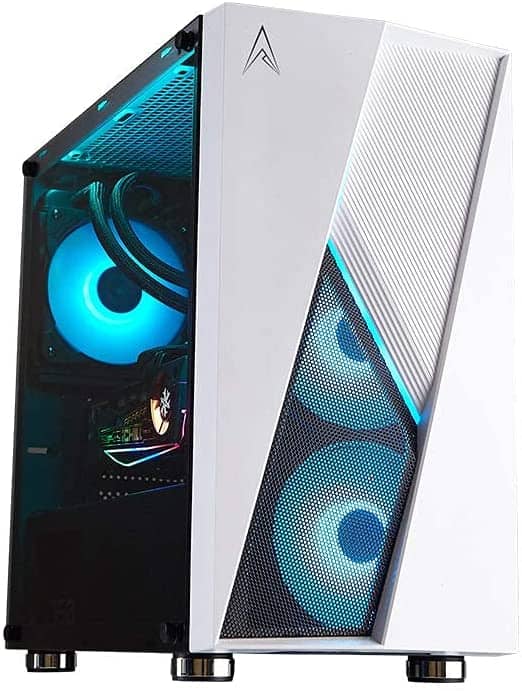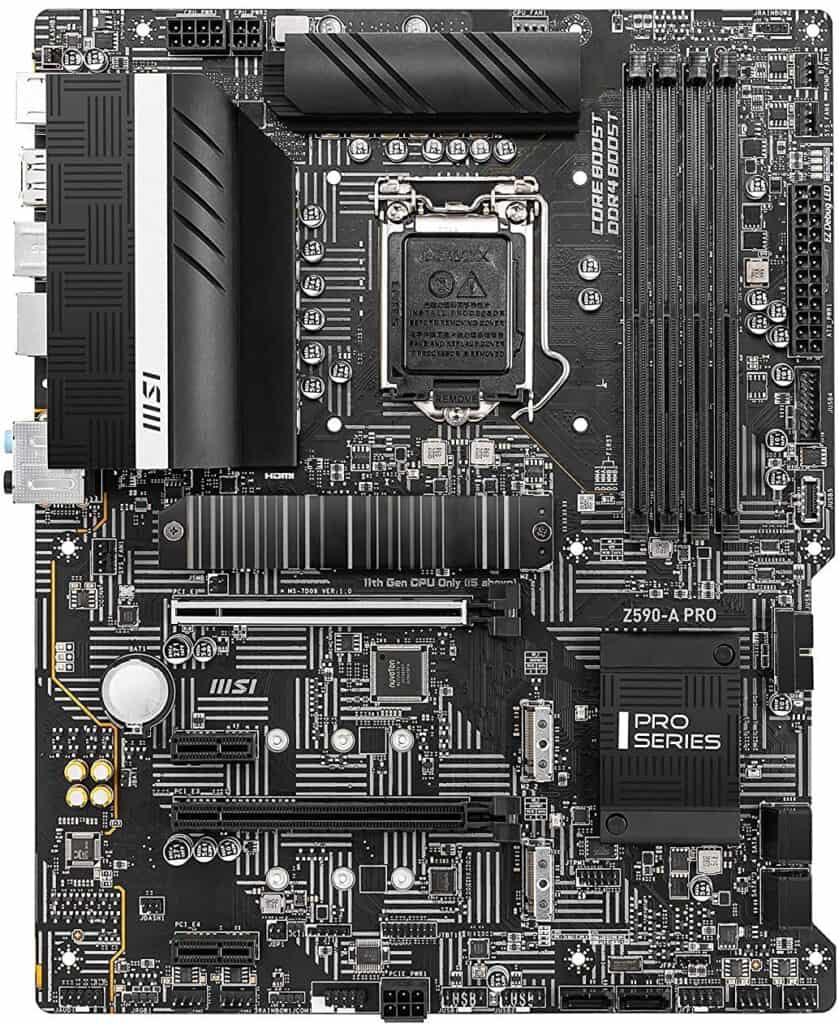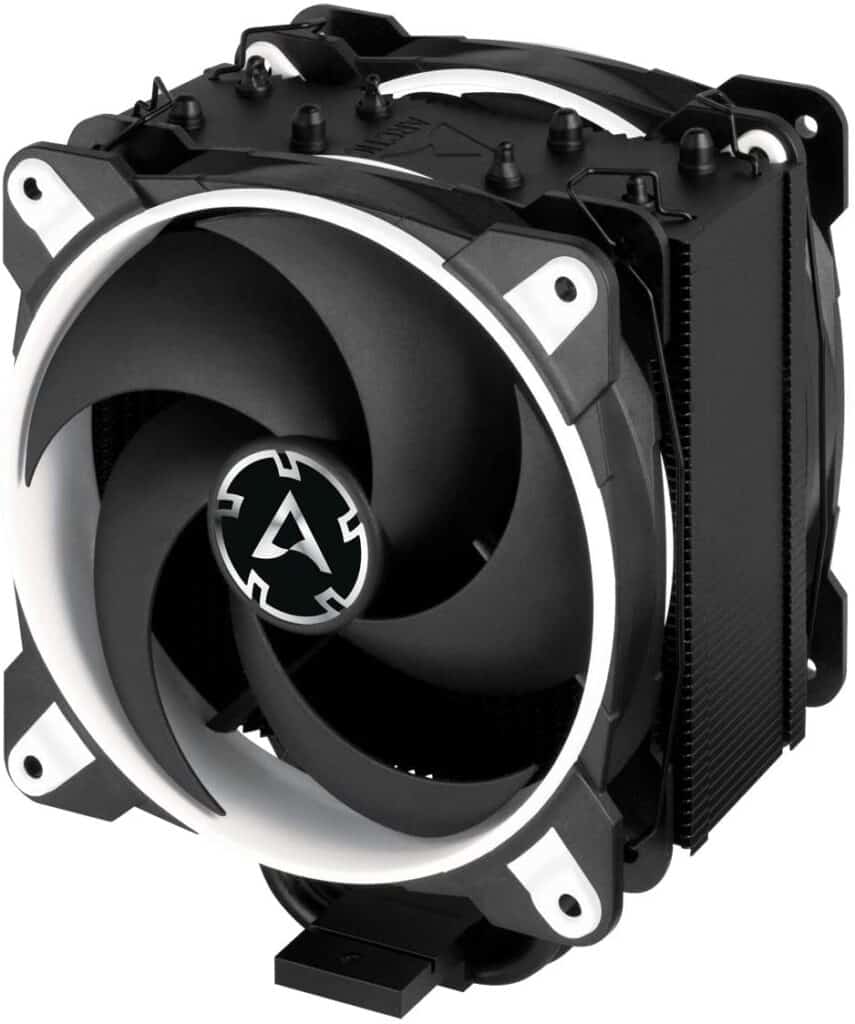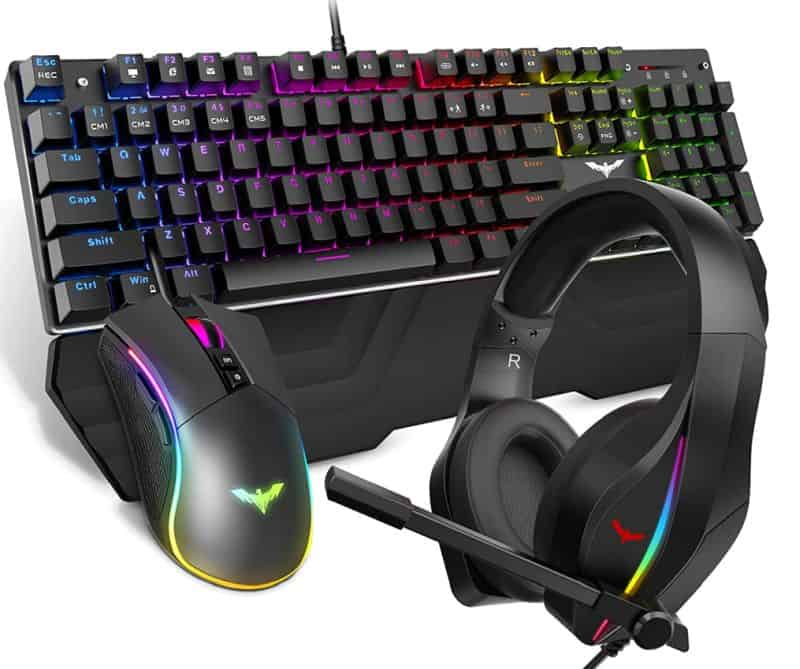Do you want to buy the best 4K gaming PC for under $ 2000? Look no further because I will advise you on what you can get for your money. Such a gaming PC will blow everything away in 1080p 1140p, but it will also provide a great gaming experience in 4K resolution (3840 x 2160 pixels).
Not only for gaming, but these configurations will also be capable of any other job, such as video processing, programming, photo processing, streaming, etc. I opted for two variants, one based on Intel and the other on the AMD platform. Both versions will be able to give you the enjoyment of your favorite game titles in 4K at 60+ FPS.
We will also compare the price of the two variants you can buy. The first variant is to build your gaming PC from the recommended components, and another option is to purchase a prebuilt PC from the same or similar parts.
Table of Contents
Best AMD Gaming PC Build under $ 2000
To assemble your new desktop PC from the listed components, you need to follow the guide to building your first PC. I’ve described the whole building process in detail, and if you have any additional questions, don’t hesitate to ask. It’s also good to read some helpful tips on building your first PC.
What can you expect from a PC like this in terms of performance? Please see in the test a similar RX 6700 XT configuration.
AMD Prebuilt Gaming PC
Don’t have the time or will to build a PC configuration on your own? In that case, you have a prebuilt PC that will work for you right after you take it out of the box. You get the operating system and drivers installed on each prebuilt PC. All you have to do is turn on your computer and install your favorite games. If you’re interested in this approach, let’s look at what’s on offer for $ 2000 with similar specifications as the AMD configuration above.
Allied Gaming Stinger | |
Motherboard (MB) | Asus TUF Gaming B550-Plus |
Processor (CPU) | AMD Ryzen 7 5800X with Allied Ice Cube 120mm ARGB Liquid CPU Cooler |
Graphics Card (GPU) | XFX RX 6700 XT 12GB DDR6 |
Solid State Drive (SSD) | M.2 512GB NVMe PCIe Gen3 |
Hard Disk Drive (SSD) | N/A |
Memory (RAM) | 16GB (2x8GB) DDR4 3600Mhz |
Power Supply Unit (PSU) | 800W 80+ Gold |
Operating System (OS) | Windows 10 Home 64-bit |
Extras | Keyboard and Mouse, WiFi Included, Tempered Glass Side Case Panel, Custom ARGB Case 16 Color Lighting |
Please note that brands listed in the specification will vary depending on the stock vary. | |
AMD Gaming PC Build vs. Prebuilt Gaming PC
Comparing these two systems, we can draw several conclusions:
- The performance of these two systems is identical.
- The prebuilt system is currently about $ 200 cheaper.
- You aren’t sure which components you will get in a prebuilt PC because it depends on the state of the manufacturer’s stock.
- You have more freedom to choose parts if you build a PC from scratch.
So, take a prebuilt computer if you don’t have time, and you wouldn’t be building your computer, but you want a system that will work right out of the box. For brave users who wish to fully control what they are installing in their future gaming system and get the most out of it, I recommend building a PC on your own.
Intel Gaming PC Build
As for the Intel configuration, there has been a slight change in the motherboard, processor, and graphics card compared to the AMD system. The price of the Intel system is also below 2000 USD, but the performance doesn’t lag behind the competition.
Intel Prebuilt Gaming PC
Lenovo Legion Tower 7i | |
Motherboard (MB) | HP Z490 |
Processor (CPU) | Intel Core i7-11700KF with CPU AIO with RGB light |
Graphics Card (GPU) | NVIDIA GeForce RTX 3070 8GB |
Solid State Drive (SSD) | M.2 1TB NVMe PCIe Gen3 |
Hard Disk Drive (SSD) | N/A |
Memory (RAM) | 16GB (2x8GB) DDR4 3200Mhz |
Power Supply Unit (PSU) | HP 650W 80+ Gold |
Operating System (OS) | Windows 10 Home 64-bit |
Extras | Lighting: Legion OY iconic LED + Internal ambient lighting, Fan: 3x Front ARGB + 1x Rear ARGB |
Please note that brands listed in the specification will vary depending on the stock vary. | |
Intel Gaming PC Build vs. Prebuilt Gaming PC
The performance of these two Intel systems is identical, except that the branded Lenovo system is about $ 200 more expensive, but you also get AIO water cooling for the CPU. If you decide to build your PC, no one is stopping you from combining components of your choice (from Intel or AMD proposal) to get the most out of your gaming system.
Components for Gaming PC Build
If you decide to build a gaming PC on your own, I will briefly describe the components I suggested. AMD or Intel systems are pretty enough for comfortable gaming in 4K. Also, note that only the essential PC components are listed, but you will need peripherals (mouse, keyboard, headphones, or monitor) that you may not currently have.
Case
Phanteks P400A Digital is a real example of how a quality build comes at an affordable price. Its attractive but simple design will easily fit into your interior. You can choose between black and white case colors. The P400A is an excellent case with plenty of room for even the most powerful components that will cool well, thanks to well-designed ventilation. Best of all, this great case costs just under $ 100, but if you don’t like the design, check out other affordable PC cases in this price range.
Motherboard
Intel
MSI’s Z590-A Pro for the 10th and 11th generation Intel processors comes with the powerful Z590 chipset at a very affordable price. The board is in full ATX format, comes in a combination of black and white, and will easily blend in with the rest of the hardware in the case. It has 4 RAM slots for a maximum of 128GB and will support 4000MHz + RAM without any problems on the standard XMP profile.
The Z590-A Pro has an excellent integrated audio chipset (Realtek ALC897) and a high-speed, built-in Ethernet controller (Intel 2.5Gbps). In addition to three M.2 NVMe slots, the board comes with 6 SATA ports for additional storage. You also get 8 USB ports on the back (4x USB 3.2, 4x USB 2.0) and 5x USB 3.2 ports for the front panel, multiple connectors for fans, etc. So, the board has everything you might need to build at this level for an Intel-based configuration.
AMD
I would suggest the MSI MPG X570 Gaming Plus for the AMD platform, with the most powerful AMD chipset at an affordable price. The board is in full ATX format, comes in a combination of black and red, and will fit nicely with the Arctic CPU cooler. It has 4 RAM slots for a maximum of 128GB and will support 4000MHz + RAM without any problems on the standard A-XMP profile.
MSI MPG X570 features an excellent integrated audio chipset (Realtek ALC1220) and a solid Ethernet Realtek 8111H Gigabit controller. In addition to two M.2 NVMe slots, the board comes with 6 SATA ports for extra storage. You also get 8 USB ports on the back (6x USB 3.2, 2x USB 2.0) and 4x USB 3.2 ports for the front panel, multiple connectors for fans, etc. So, the board has everything you might need to build at this level for an AMD-based configuration.
CPU
Intel
Intel’s 11th generation Core i7 11700KF is a powerful 8-core processor for gaming, content creation, streaming, etc. The KF suffix in the label suggests that the processor has an unlocked multiplier for easy overclocking and lacks an integrated graphics card. The lack of an already weak integrated chip isn’t a problem because I suggest a potent discrete graphics card with this CPU.
As for overclocking with Core i7 11700KF, you can easily go over 5GHz. However, for any severe overclocking adventure, I recommend installing an AIO CPU cooler such as the NZXT Kraken X63 or X73. The CPU will run at 5Ghz with the turbo mode even without overclocking.
Intel doesn’t ship the cooler with the Core i7-11700KF, so the decision fell on Arctic’s excellent Freezer 34 eSports DUO. In addition to this cooler, I recommend CM Hyper 212, Noctua NH-U12, or some AIO cooling solution.
AMD
The Ryzen 7 5800X is an excellent alternative to Intel’s Core i7-11700KF processor. AMD’s processor has 8-cores and 16-threads. Its base clock is 3.8GHz, with the possibility of turbo frequency up to 4.7 GHz.
Interestingly, in most gaming tests, the Ryzen 7 5800X doesn’t stand out too much from the cheaper Ryzen 5 5600X. Only with the Ryzen 9 5900X can you feel a shift in performance, but it’s an even more expensive option coming out of a projected budget of $ 2000.
So, if your budget is slim, you won’t lose more than a few percent in gaming performance by choosing the cheaper Ryzen 5 5600X over the 5800X.
Graphics Card
AMD
I recommend two graphics cards for AMD or Intel configuration. As a first choice, it’s XFX QICK 319 Radeon RX 6700 XT with 12GB of GDDR6 memory. The RX 6700 XT is a Navi 22 graphics processor with RDNA2 architecture that uses 40 Ray Tracing accelerators and 2560 stream executables. It operates at frequencies close to 2.6 GHz and delivers good performance in 1080, 1440p, and 4K resolutions.
The next step in performance would be the RX 6800 XT and RX 6900 XT graphics cards, but these are much more expensive options that go beyond the projected budget. For regular operation, the XFX RX 6700 XT requires 2 x PCIe 8pin connectors from a power supply of at least 650W.
Also, pay attention to the graphics card dimensions; 12.72 x 5.20 x 2.01 inches. The Phanteks P400A case can easily accommodate this graphics card (max graphics length up to 16.7 inches).
You have 3x Display Port 1.4 with DSC and 1x HDMI 2.1 with support for VRR and FRL from the ports. Of course, support for AMD VR goes without saying.
NVIDIA
EVGA GeForce RTX 3070 XC3 ULTRA GAMING with 8GB GDDR6 is a powerful graphics card that will give you a great gaming experience. Unlike the AMD RX 6700 XT, which has a memory bus width of 192-bit, the RTX 3070 has a 256-bit bus. The advantage of the AMD GPU is a more significant amount of memory (12GB GDDR6) that runs at a slightly higher speed than the RTX 3070. RTX GPU chips can boast real-time Ray Tracing for an even more realistic display of details in games.
Those who want even better performance have more expensive models, RTX 3080 and RTX 3090, but you also have to pay more money for more potent versions. The RTX 3070 requires 2 x PCIe 8pin connectors from a power supply of at least 650W.
The EVGA model is factory overclocked and has excellent cooling, plus some discrete RGB lighting on the EVGA logo. The dimensions of the graphics card are similar to those of the XFX RX 6700 XT model, so there will be no problem fitting it into the planned Phanteks case. You have 3x DisplayPort and 1X HDMI available for connectivity, and NVIDIA is behind full VR support for its RTX models.
RAM
16GB of DDR4 RAM is enough for any gaming PC in today’s conditions. For the recommended configurations you would do on your own (AMD or Intel), I chose the Corsair Vengeance RGB Pro 16GB (2x8GB) DDR4 at 3600Mhz. Its high-performance RAM will beautify the case’s interior with RGB lighting.
If you intend to do some more demanding work, you can immediately go to 32GB (2x16GB), although the board has 4 RAM slots in case of subsequent expansion. Always take RAM in pairs to keep your system running in dual-channel mode.
PSU
EVGA SuperNova 750 G5 is a compact, high-quality, reliable, and utterly modular power supply that the manufacturer has guaranteed for as long as ten years. The power supply is 80+ Gold certified with at least 91% efficiency under typical load.
Since the SuperNova G5 is entirely modular, you don’t have to worry about excess cables that you won’t need. Also, the modular PSU is ideal for good cable management, with which you will have good airflow. 750W is enough to power all components, and in case of any problems, you have + 24/7 technical support from EVGA.
Storage
I chose a fast WD BLACK SN750 SE for the storage space. It’s a PCIe Gen4 NVMe SSD with a capacity of 1 TB that will make your operating system and applications run much faster than on a classic SATA SSD. If you are a demanding user, you may find this small for all the favorite games you plan to install. In that case, this may be your primary disc, with a few favorite games on it.
You can set up a secondary SATA SSD with a capacity of 1TB or more that will hold other games and essential data. This combination will unload the primary disk, and generally, everything will work much more comfortably.
Periphery
Suppose you have a monitor, mouse, keyboard, and headphones left over from your old PC. Then it would be best to have nothing more to buy than the estimated budget for this 4K Gaming PC build under $ 2000.
But if you don’t have peripherals, you’ll have to get them to complete your gaming PC. Furthermore, I will recommend cheap but enough quality peripherals that will not burden your wallet with the planned budget for building your gaming PC.
Monitor
ASUS VP28UQG 4K Monitor
The ASUS VP28UQG is a 28″ gaming monitor with a TN panel and a maximum resolution of 3840 x 2160 (4K). The build quality is average but solid. You can’t raise the screen vertically, but you can control the horizontal tilt from -5 ° to 20 °. I wish the screen frame were thinner, and the monitor had better ergonomics, but it shouldn’t be too strict, given the price.
Due to the lower price, Asus opted for the TN panel, which has significantly narrower viewing angles than IPS or VA panels. But given the size of the screen, you’ll hardly look from the side rather than sit in front while gaming or watching movies.
The TN panel is also good because of the fast response of 1ms, so it’s suitable for FPS games. There are no noticeable ghosts or blurring during fast action. Thanks to the 4K resolution, the image is sharp and clear.
The screen is flicker-free and has an integrated blue light filter for reduced eye strain. VP28UQG also supports AMD FreeSync but is compatible with NVIDIA G-Sync through Adaptive Sync. As for the connectors, Asus 4K gaming monitor has two HDMI and one DisplayPort, enough for most users. The monitor has no built-in speakers and has one audio output for headphones.
The OSD menu is quite simple and easy to navigate, thanks to the 5-way joystick located on the back of the monitor (red). There’s also a GamePlus option in the OSD menu through which you can set a timer, FPS counter, and various variants for crosshair overlay.
Keyboard mouse combo
HAVIT Mechanical Keyboard+Mouse+Headset Kit
Havit keyboard comes in 104 Key full-size, so it takes up sufficient space on the table. This kit contains a mechanical gaming keyboard, wrist rest, mouse, and headset. The build quality is good, but nothing special. The design is quite decent and oriented towards the gaming population.
For this price, you get a mechanical keyboard. It comes with Outemu Blue switches and an RGB backlight. The mouse comes with six levels of DPI sensitivity (800/1600/2400/3200/4000/4800) with easy adjustment. The headphones are a budget variant, the sound quality is mediocre, and the RGB works appropriately.
Lighting effects come with 14 predefined settings on the keyboard and seven on the mouse. The headphones have also implemented RGB lighting, which will complete the atmosphere.
Given the relatively low price of this kit, one should not be too critical. If a small budget limits you, it’s worth taking. You get a rounded offer that’s hard to resist, especially for this money. You can’t ask for more. Alternatively, you can peek at our list of best gaming keyboards for under $ 50.
WiFi for gaming PC
The selected motherboard doesn’t have a built-in WiFi adapter in this price range. If you want a WiFi connection for your gaming PC, you need an internal PCI card or an external USB adapter. The recommendation for a WiFi adapter goes to an external USB adapter because it’s much easier to handle.
External WiFi adapter
TP-Link AC600 USB WiFi Adapter for PC (Archer T2U Plus)
If you are bothered to open a desktop computer and insert a PCIe WiFi card, here’s the solution. Also, this is a good and fast solution to connect to WiFi if you don’t have an Ethernet cable nearby. Windows 10 will recognize this device and run at 2.4 GHz with the generic driver.
To work at 5Ghz, you need to download the appropriate driver. The driver on the supplied CD will probably work, but I recommend downloading the latest driver from the manufacturer’s website. The card has a solid 5dbi signal via a built-in antenna, a decent bit rate, and support for Mac OS. In addition, the adapter works very well and has good value for money.
Operating system (OS)
Today you can choose between two popular PC operating systems: Windows and Linux. If you are tight on budget and don’t want to spend more than buying hardware, you choose one of the Linux distributions.
Popular distributions of Linux (which visually most resemble Windows) are Linux Lite, Zorin OS, and Ubuntu. These are all free distros of the Linux operating system. Linux’s only downside is that they require more customization and have narrowed support for games and programs, unlike Windows.
If you want a legitimate copy of Windows, I recommend getting at least the basic version of Windows Home. Windows has many games and programs, has ironed drivers, and runs pretty smoothly.
You can install Windows on your PC in two ways, via a USB flash drive or an optical drive (CD or DVD). Here you can find a pre-installed Windows 10 on a USB flash drive. See the instructions here to install your copy of the OS on a USB flash drive.
Conclusion
If you are looking for the best gaming PC that will successfully handle all new AAA games, you can certainly do so for around $ 2000. Expect great performance in 1080p, 1440p but also in 4K with 60+ FPS. The recommended monitor ASUS VP28UQG is the entry-level 4K gaming monitor, and buy it only in the issue of a small budget for more expensive models.
If you have any additional questions or suggestions, don’t hesitate to leave a comment.
